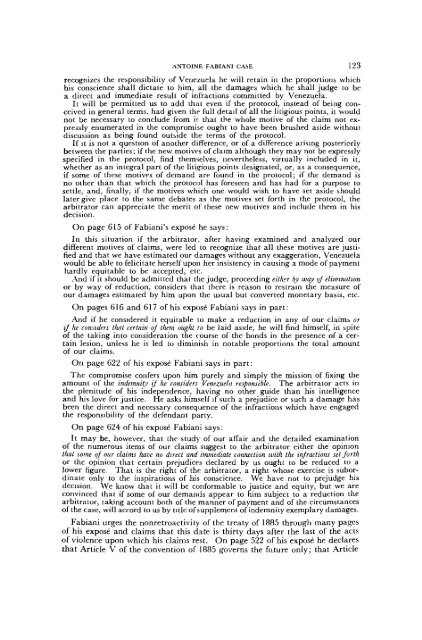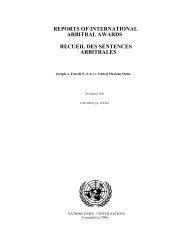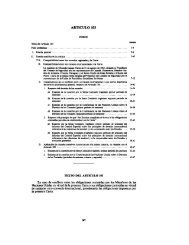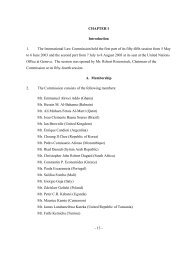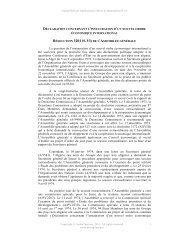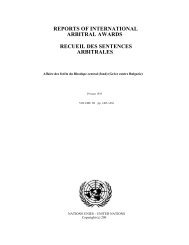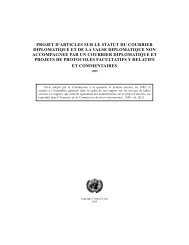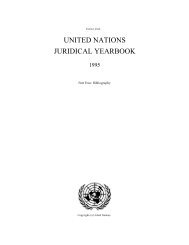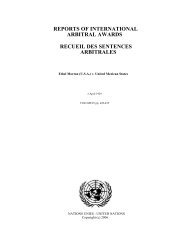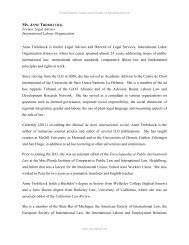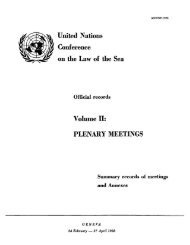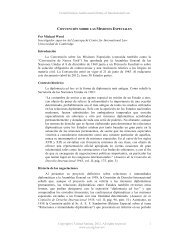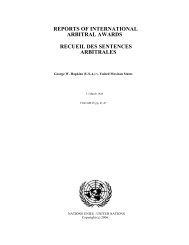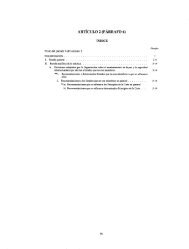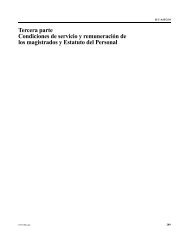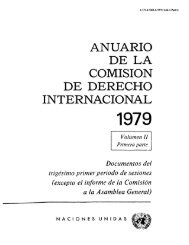Antoine Fabiani Case - United Nations Treaty Collection
Antoine Fabiani Case - United Nations Treaty Collection
Antoine Fabiani Case - United Nations Treaty Collection
You also want an ePaper? Increase the reach of your titles
YUMPU automatically turns print PDFs into web optimized ePapers that Google loves.
ANTOINE FABIANI CASE 123<br />
recognizes the responsibility of Venezuela he will retain in the proportions which<br />
his conscience shall dictate to him, all the damages which he shall judge to be<br />
a direct and immediate result of infractions committed by Venezuela.<br />
It will be permitted us to add that even if the protocol, instead of being conceived<br />
in general terms, had given the full detail of all the litigious points, it would<br />
not be necessary to conclude from it that the whole motive of the claim not expressly<br />
enumerated in the compromise ought to have been brushed aside without<br />
discussion as being found outside the terms of the protocol.<br />
If it is not a question of another difference, or of a difference arising posteriorly<br />
between the parties; if the new motives of claim although they may not be expressly<br />
specified in the protocol, find themselves, nevertheless, virtually included in it,<br />
whether as an integral part of the litigious points designated, or, as a consequence,<br />
if some of these motives of demand are found in the protocol; if the demand is<br />
no other than that which the protocol has foreseen and has had for a purpose to<br />
settle, and, finally, if the motives which one would wish to have set aside should<br />
later give place to the same debates as the motives set forth in the protocol, the<br />
arbitrator can appreciate the merit of these new motives and include them in his<br />
decision.<br />
On page 615 of <strong>Fabiani</strong>'s exposé he says:<br />
In this situation if the arbitrator, after having examined and analyzed our<br />
different motives of claims, were led to recognize that all these motives are justified<br />
and that we have estimated our damages without any exaggeration, Venezuela<br />
would be able to felicitate herself upon her insistency in causing a mode of payment<br />
hardly equitable to be accepted, etc.<br />
And if it should be admitted that the judge, proceeding either by way of elimination<br />
or by way of reduction, considers that there is reason to restrain the measure of<br />
our damages estimated by him upon the usual but converted monetary basis, etc.<br />
On pages 616 and 617 of his exposé <strong>Fabiani</strong> says in part:<br />
And if he considered it equitable to make a reduction in any of our claims or<br />
if he considers that certain of them ought to be laid aside, he will find himself, in spite<br />
of the taking into consideration the course of the bonds in the presence of a certain<br />
lesion, unless he is led to diminish in notable proportions the total amount<br />
of our claims.<br />
On page 622 of his exposé <strong>Fabiani</strong> says in part:<br />
The compromise confers upon him purely and simply the mission of fixing the<br />
amount of the indemnity if he considers Venezuela responsible. The arbitrator acts in<br />
the plenitude of his independence, having no other guide than his intelligence<br />
and his love for justice. He asks himself if such a prejudice or such a damage has<br />
been the direct and necessary consequence of the infractions which have engaged<br />
the responsibility of the defendant party.<br />
On page 624 of his exposé <strong>Fabiani</strong> says:<br />
It may be, however, that the study of our affair and the detailed examination<br />
of the numerous items of our claims suggest to the arbitrator either the opinion<br />
that some of our claims have no direct and immediate connection with the infractions set Jorth<br />
or the opinion that certain prejudices declared by us ought to be reduced to a<br />
lower figure- That is the right of the arbitrator, a right whose exercise is subordinate<br />
only to the inspirations of his conscience. We have not to prejudge his<br />
decision. We know that it will be conformable to justice and equity, but we are<br />
convinced that if some of our demands appear to him subject to a reduction the<br />
arbitrator, taking account both of the manner of payment and of the circumstances<br />
of the case, will accord to us by title of supplement of indemnity exemplary damages.<br />
<strong>Fabiani</strong> urges the nonretroactivity of the treaty of 1885 through many pages<br />
of his exposé and claims that this date is thirty days after the last of the acts<br />
of violence upon which his claims rest. On page 522 of his exposé he declares<br />
that Article V of the convention of 1885 governs the future only; that Article


